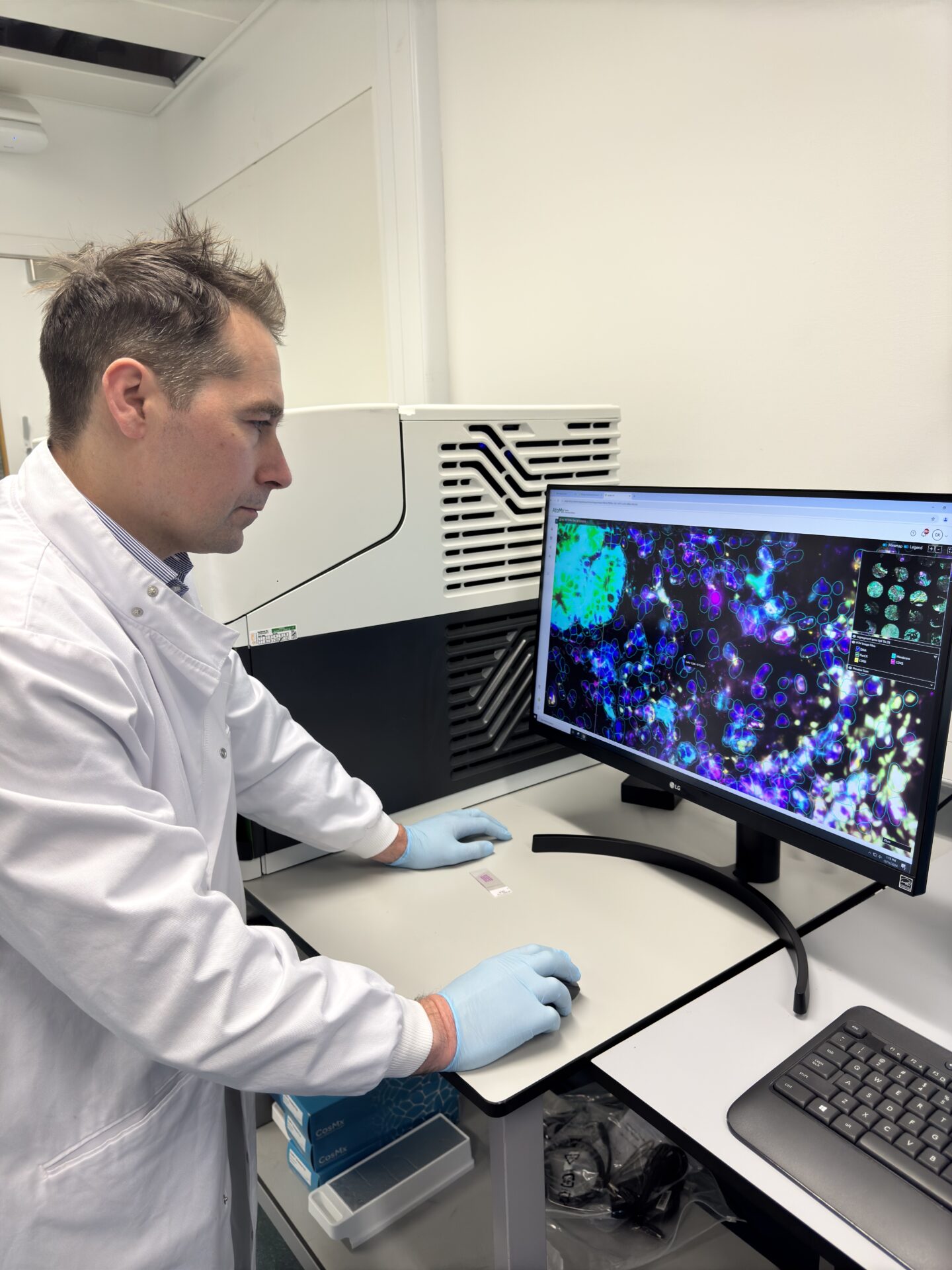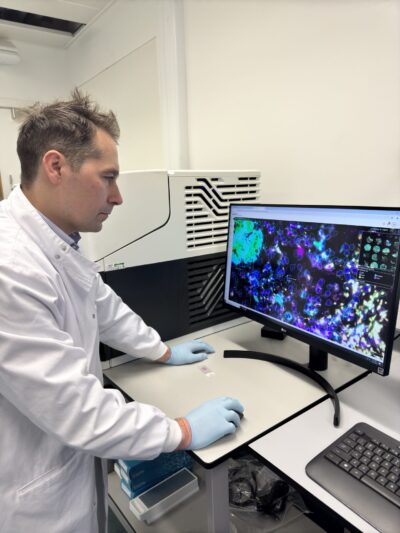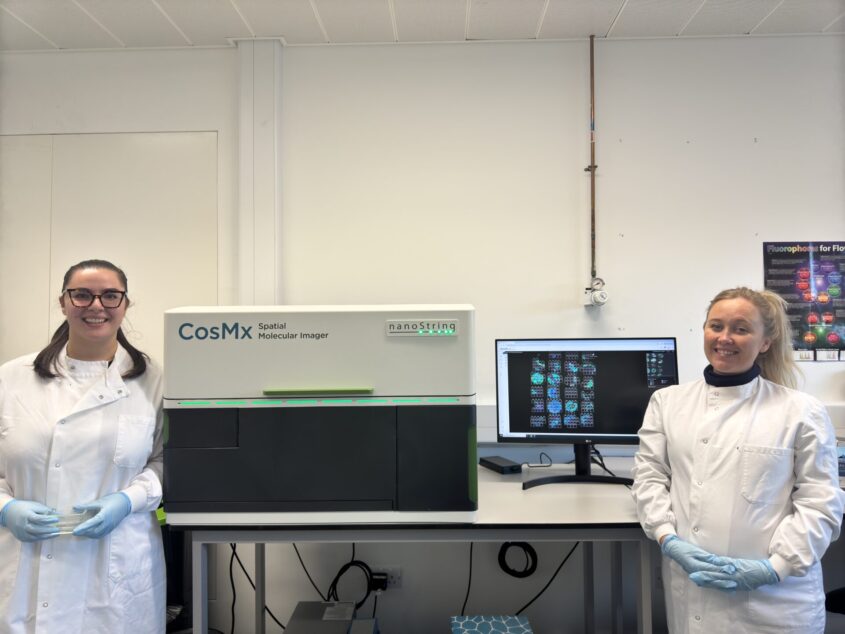



Glasgow scientists to uncover how ‘time bomb’ cysts develop into deadliest common cancer
We awarded almost £500,000 to researchers at the University of Glasgow to uncover why pancreatic cysts develop into pancreatic cancer.
Researchers at the University of Glasgow have been awarded almost £500,000 to uncover why pancreatic cysts develop into pancreatic cancer. Pancreatic cysts are common: 20% of people over 60 have one. The findings of this research could help to identify those at high-risk of developing cancer so that they can be closely monitored, as well as give reassurance to the millions with a benign cyst.
Around 10% of pancreatic cysts will develop into pancreatic cancer. Identifying what high-risk cysts look like, so that they can be closely monitored, is imperative to improving treatment and survival rates. Pancreatic cancer is the deadliest common cancer: over half of people die within three months of diagnosis. It’s difficult to diagnose at an early stage, with over 80% of people not diagnosed until after the disease has spread and is no longer operable.
The project, headed by Professor Nigel Jamieson, has been awarded £499,417 as part of our recent investment into early detection research across the UK, totalling almost £1 million. This has been made possible because of the incredible generosity of the Ellis family, in memory of Lesley, and the Freddie Green & Family Charitable Foundation, in memory of Jo.
The concept for the research originated directly from the concerns of patients who have a cyst and feel they are living with a “time bomb in their pancreas”.
By deepening our understanding of why some pancreatic cysts evolve into cancer while others remain benign, we aim to bring meaningful breakthroughs to the fight against pancreatic cancer.
Cysts are saclike pockets of fluid that are usually benign, but in around 10% of cases, they will develop into pancreatic cancer. The charity estimates that as many as 292,464 people in Scotland aged over 60 currently have a cyst and 29,246 could go on to develop into pancreatic cancer. Once a cyst has been identified, it is difficult for doctors to know what to do next. Surgery to remove them is complicated and can lead to death in rare cases. Due to this uncertainty, the management of pancreatic cysts varies between different specialists and hospitals.
We believe that increased understanding of the progression of pancreatic cysts to pancreatic cancer will help to identify high-risk cysts. It will also give the millions who have a benign cyst some peace of mind for the first time, and help them avoid unnecessary, risky treatment.
Britney Alex, 26 from Glasgow suffered with persistent stomach pains for over a year. She went to her local hospital where she was initially diagnosed with a stomach infection and was given antibiotics. However, the pain continued and became unbearable in late August 2023. She went back to hospital where they ordered a CT scan that showed a large cyst on her pancreas which was also affecting her other organs. Britney was booked in to have the cyst removed April 2024, but she was rushed to A&E twice whilst waiting, so the surgery was moved up to March.
Britney said, “Being so young and hearing I had a pancreatic cyst, it was quite scary. The surgery went well, however once they had removed the cyst, I was told that it was one stage away from developing into pancreatic cancer.”
Britney has since joined the surveillance programme run by Professor Nigel Jamieson and has regular check-ups to ensure any changes to her pancreas are spotted as soon as possible.
I don’t have a family history of cancer, so I was really taken aback. It is worrying to know I could have been one of the 10% who had a cyst develop into cancer. However, I am glad to be part of this research to help spread awareness
Britney said: “ I think my cyst took so long to uncover because I am so young; it never crossed their mind it could have been that.”
Researchers will use cutting-edge imaging and analysis techniques to study over 550 patient cyst tissue samples. Using these samples, the team will produce a detailed map that shows how individual cells are positioned within the cysts, how the cells communicate with each other, and how they help a cyst develop into pancreatic cancer.
The researchers will use the map to analyse various points of cyst development as it progresses to pancreatic cancer. They will then compare the test findings against the cyst tissue samples to help confirm the best indicators for high-risk cysts that are most likely to develop into pancreatic cancer.


Professor Nigel Jamieson from University of Glasgow, School of Cancer Sciences and Glasgow Royal Infirmary said:
“We are honoured to receive funding to advance our research into pancreatic pre-malignant cysts using state-of-the-art spatial biology technologies. This award provides an invaluable opportunity to explore the early biological changes in pancreatic cancer, potentially paving the way for earlier diagnosis and improved patient outcomes.
By generating detailed molecular maps of pancreatic cysts, our research will leverage AI-driven strategies to uncover patterns in the data that could help identify targets to halt or reverse the progression towards cancer. This work will also support a new generation of early-career pancreatic cancer researchers, equipping them with the skills, knowledge and network to drive innovation in this challenging field. By deepening our understanding of why some pancreatic cysts evolve into cancer while others remain benign, we aim to bring meaningful breakthroughs to the fight against pancreatic cancer.”
Dr Chris Macdonald, Head of Research at Pancreatic Cancer UK, said:
“One of the biggest challenges of pancreatic cancer is early detection. In most cases people are not diagnosed until the cancer has already spread around the body, at which stage there are no effective treatments. To improve outcomes for this devastating disease we desperately need to get better at detecting pancreatic cancer early.
“This exciting new research project will use highly sophisticated techniques to study pancreatic cysts in a high level of detail, and for the first time, find clues that will help doctors differentiate between those that are likely to progress into pancreatic cancer, and those that most likely will not. Early detection saves lives, and it is absolutely critical that we improve identification of pancreatic cancer at the earliest stages if we are to achieve our goal of doubling survival rates.”

